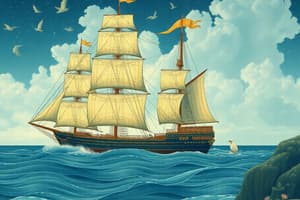Podcast
Questions and Answers
What does UNCLOS declare regarding the High Seas?
What does UNCLOS declare regarding the High Seas?
- They belong to all mankind. (correct)
- They are divided among coastal states.
- They are under the jurisdiction of the United Nations.
- They are reserved for military exercises.
Coastal states are obligated to claim all coastal jurisdiction zones defined by UNCLOS.
Coastal states are obligated to claim all coastal jurisdiction zones defined by UNCLOS.
False (B)
What should a shipmaster NOT assume about their vessel's location relative to a state's coastline?
What should a shipmaster NOT assume about their vessel's location relative to a state's coastline?
A shipmaster should not assume their vessel is within or outside a particular zone simply by reference to the vessel's distance from a state's coastline.
Foreign flag vessels have a right of innocent passage through internal waters when baselines have been ______ enclosing waters previously seaward of the baselines.
Foreign flag vessels have a right of innocent passage through internal waters when baselines have been ______ enclosing waters previously seaward of the baselines.
Match the circumstances with the coastal state's jurisdiction in internal waters:
Match the circumstances with the coastal state's jurisdiction in internal waters:
What is the maximum extent of the territorial sea a coastal state can claim, according to UNCLOS?
What is the maximum extent of the territorial sea a coastal state can claim, according to UNCLOS?
A coastal state can permanently suspend the right of innocent passage through its territorial sea in specified areas for security reasons.
A coastal state can permanently suspend the right of innocent passage through its territorial sea in specified areas for security reasons.
List three activities that are NOT considered innocent passage.
List three activities that are NOT considered innocent passage.
In the territorial sea, a coastal state should not exercise criminal jurisdiction on a foreign vessel unless the consequences of a ______ extend to the coastal state.
In the territorial sea, a coastal state should not exercise criminal jurisdiction on a foreign vessel unless the consequences of a ______ extend to the coastal state.
Match the zone with its jurisdiction:
Match the zone with its jurisdiction:
What is the primary characteristic of straits transit passage?
What is the primary characteristic of straits transit passage?
Archipelagic waters have identical status to internal waters.
Archipelagic waters have identical status to internal waters.
What is the main purpose of the contiguous zone?
What is the main purpose of the contiguous zone?
The exclusive economic zone (EEZ) can extend to a maximum of ______ nautical miles from the baseline.
The exclusive economic zone (EEZ) can extend to a maximum of ______ nautical miles from the baseline.
Match the activity with the appropriate maritime zones:
Match the activity with the appropriate maritime zones:
What is a key characteristic of the legal regime of the High Seas?
What is a key characteristic of the legal regime of the High Seas?
Warships on the high seas are subject to the jurisdiction of any state.
Warships on the high seas are subject to the jurisdiction of any state.
What is the duty of a ship regarding assistance on the high seas?
What is the duty of a ship regarding assistance on the high seas?
According to UNCLOS, The continental shelf is primarily considered a ______ zone for coastal states.
According to UNCLOS, The continental shelf is primarily considered a ______ zone for coastal states.
Match the following regulations with the responsible entity on the High Seas:
Match the following regulations with the responsible entity on the High Seas:
Flashcards
What is UNCLOS?
What is UNCLOS?
A treaty document of 446 articles grouped under 17 parts/ headings and 9 annexes.
What are the key provisions of UNCLOS?
What are the key provisions of UNCLOS?
Declares that the High Seas belong to all mankind, demarcates coastal jurisdiction zones, and defines the right of innocent passage.
What are the Coastal Jurisdiction Zones?
What are the Coastal Jurisdiction Zones?
Internal waters, Territorial sea, Archipelagic waters, Contiguous zone, Fisheries limits, Continental shelf, Exclusive economic zone, and High Seas.
What are Internal Waters?
What are Internal Waters?
Signup and view all the flashcards
When is innocent passage allowed in Internal Waters?
When is innocent passage allowed in Internal Waters?
Signup and view all the flashcards
What is the Territorial Sea?
What is the Territorial Sea?
Signup and view all the flashcards
Can innocent passage be suspended?
Can innocent passage be suspended?
Signup and view all the flashcards
What activities are not considered innocent?
What activities are not considered innocent?
Signup and view all the flashcards
When can a state exercise criminal jurisdiction?
When can a state exercise criminal jurisdiction?
Signup and view all the flashcards
Transit passage obligations in straits?
Transit passage obligations in straits?
Signup and view all the flashcards
What rights do coastal states have in straits?
What rights do coastal states have in straits?
Signup and view all the flashcards
What are Archipelagic Waters?
What are Archipelagic Waters?
Signup and view all the flashcards
What is the Contiguous Zone?
What is the Contiguous Zone?
Signup and view all the flashcards
Which vessels can be turned away in the contiguous zone?
Which vessels can be turned away in the contiguous zone?
Signup and view all the flashcards
What is the Inshore Fishery Zone (IFZ)?
What is the Inshore Fishery Zone (IFZ)?
Signup and view all the flashcards
What is the Extended Fisheries Zone (EFZ)?
What is the Extended Fisheries Zone (EFZ)?
Signup and view all the flashcards
What is the Continental Shelf?
What is the Continental Shelf?
Signup and view all the flashcards
Rights over artificial islands on the Continental Shelf?
Rights over artificial islands on the Continental Shelf?
Signup and view all the flashcards
What is the Exclusive Economic Zone (EEZ)?
What is the Exclusive Economic Zone (EEZ)?
Signup and view all the flashcards
What are the High Seas?
What are the High Seas?
Signup and view all the flashcards
Study Notes
UNCLOS Overview
- The United Nations Convention on the Law of the Sea (UNCLOS) is a treaty document
- UNCLOS contains 446 articles, divided into 17 parts/headings and 9 annexes
- UNCLOS came into force internationally on November 16, 1994
- UNCLOS III convention in 1982 was the original outcome
Key Provisions of UNCLOS
- The High Seas are declared as belonging to all mankind
- Coastal jurisdiction zones are demarcated in the convention
- The right of innocent passage is defined
Coastal Jurisdiction Zones
- Internal waters exist
- Territorial sea exists
- Archipelagic waters exist
- Contiguous zone exists
- Fisheries limits exist
- Continental shelf exists
- Exclusive economic zone exists
- High Seas exist, belonging to all
- Coastal states can choose which zones to claim and how far to extend them
- Prescribed maximum limits are in place respecting zone claims
Important Considerations for Mariners
- Varying zone limits among states means shipmasters cannot rely solely on distance from a coastline
- Consult Annual Notices to Mariners No. 12 for individual state claims
- The Annual Notices includes Territorial Sea (TS), Contiguous Zone (CZ), Exclusive Economic Zone (EEZ), and Fishery Zone (FZ) widths for maritime states
Internal Waters
- Internal Waters extend from the shore to the territorial sea baseline
- Internal Waters are part of the coastal state’s territory
- Vessels entering internal waters voluntarily place themselves under the jurisdiction of the coastal state
- Foreign flag vessels possess right of innocent passage through internal waters in a few cases
- When baselines have been redrawn, enclosing waters previously seaward
- In situations involving force majeure (distress, weather, or mechanical breakdown), jurisdiction remains with the flag state
- Warships/public vessels are granted special status, regarded as agents of the sovereign and possess immunity with coastal state consent
Enforcement in Internal Waters
- Coastal states generally don't enforce laws on foreign-flagged vessels unless their interests are engaged
- Laws are enforced when an offence affects port order, and when the vessel master requests jurisdiction
- Laws are enforced when a non-crew member is involved, and when vessel breaches local regulations
Territorial Sea
- The territorial sea may extend up to 12 nautical miles from the baseline
- Over 100 international straits, including the Dover Strait, lost their 'high seas' corridors.
- The territorial sea is part of a coastal state's territory, has distinct juridical status
- Foreign flag vessels have the right of innocent passage
Innocent Passage
- Innocent passage can be suspended temporarily in specific areas for coastal state security
- Suspension is essential for weapons exercises or similar activities
- Vessels passing through the territorial sea must ensure their activities are innocent
- Activities considered non-innocent include threat/use of force, weapons practices, intelligence gathering, propaganda etc
Regulations in Territorial Seas
- Vessels must comply with legislation affecting innocent passage
- Examples include regulations on navigation safety, maritime traffic, and NAV aids
- Protection of cables/pipelines, conservation of resources, and environmental protection are types of laws
- Control may be exerted over surveying, customs, fiscal matters etc
- Vessels are required to comply with Collision Regulations
- Coastal states can exercise jurisdiction over all vessels in internal waters, but has exceptions
Criminal Jurisdiction in the Territorial Sea
- Coastal states should not exercise criminal jurisdiction unless:
- Consequences of a crime extend to the coastal state
- A crime disturbs peace or good order
- The vessel master/flag state requests jurisdiction, or when jurisdiction is needed to suppress illicit traffic
Civil Jurisdiction in the Territorial Sea
- Coastal states can only exercise civil jurisdiction over vessels that are leaving internal waters
- States bordering straits must not impede transit passage
- States bordering straits must publicise navigational dangers
- Transit passage cannot be suspended
- Coastal states can establish sea lanes and traffic separation schemes
- States can enact legislation on safety, preventing pollution, fishing, customs, etc
- Vessels must comply with these laws when passing through
- Flag states are responsible if vessels don't comply
- Ships must comply with regulations for safety, collision avoidance, and pollution prevention
Archipelagic Waters
- Established for mid-ocean archipelagic states like Fiji
- Requires constitution by one or more archipelagos.
- Status is similar to territorial sea, but with additional obligations
- Obligations include access to fishing grounds/activities, and submarine cable maintenance
- Foreign flag vessels have right of innocent passage
Contiguous Zone
- Extends 12 nautical miles beyond the territorial sea limit
- It consists of revenue, public health, and quarantine jurisdiction
- Allows for detention of vessels violating customs or public health regulations
- Used to enforce fiscal, customs, sanitation, immigration, and emigration laws
- Vessels carrying dangerous substances may be turned away.
Fisheries Zones (IFZ and EFZ)
- There are recognised inshore fishery zone (IFZ) of 12 nm, within which the coastal state exercises rights to living resources
- The extended fisheries zone (EFZ) extends to 200 nm, within which preferential rights over fish stocks are granted
- Fishing vessels must observe fisheries regulations
Continental Shelf
- Defined geologically, extending beyond 200 nautical miles from the baseline
- A maximum of 350 nautical miles may be specified. It is a resource zone, not a security zone
- It does not form part of the coastal state's territory.
- Seas above the continental shelf remain 'high seas' without an Exclusive Economic Zone
- Resources include mineral, non-living resources, and sedentary species
- Coastal states have exclusive rights to shelf resources
- Coastal states regulate artificial islands/structures and have jurisdiction over customs, health, safety, and immigration
- Safety zones of 500 meters are permitted to ensure navigation safety around artificial islands
Exclusive Economic Zone (EEZ)
- Extends to a maximum of 200 nautical miles from the baseline
- Coastal states have rights/duties regarding natural resources
- Freedom of navigation is the same as on the high seas
- Coastal states can restrict navigation for safety near offshore installations
- If no EEZ exists, high seas begin where territorial seas end
- An EEZ expands coastal state rights and jurisdiction
High Seas
- Encompass all sea areas beyond EEZ, territorial sea, and internal/archipelagic waters
- Open to all states, whether coastal or land-locked
- Freedom of navigation, overflight, laying cables/pipelines are examples of freedoms, together with construction of artificial islands which are permitted under international law
- Also comprises freedom to fish, and scientific research
- Warships have complete immunity on the high seas
- State-owned ships on government non-commercial service have complete immunity
- Penal/disciplinary proceedings are limited to the flag state in incidents
- Duty to render aid to those in danger, and rendering assistance after a collision, and exchanging identification information are some duties under the law
Other High Seas Provisions
- Ship registration and flag state obligations exist
- Prohibitions regarding slave trade, piracy, narcotics trafficking, and unauthorized broadcasting occur
- The rights of visit, seizure, arrest, and hot pursuit exist for enforcement
Studying That Suits You
Use AI to generate personalized quizzes and flashcards to suit your learning preferences.



